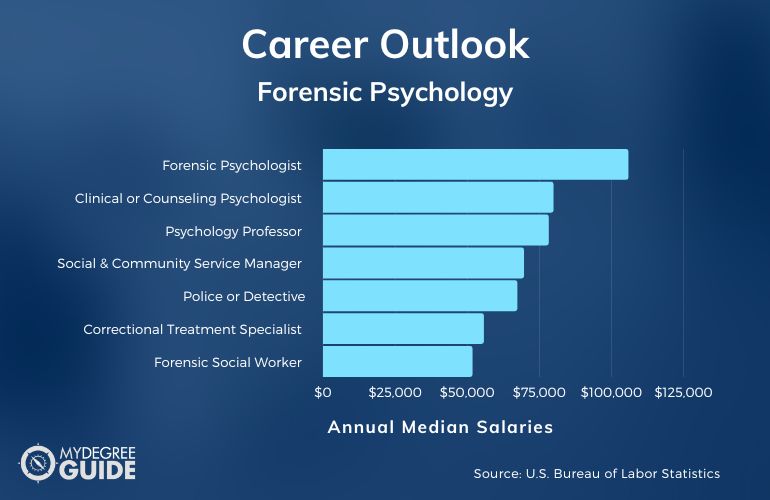What can you do with a masters in forensic psychology? Forensic psychology deals with the application of psychology within the legal system.

If you plan to become a licensed psychologist, a masters can be a strategic stepping stone toward a doctoral degree.
Editorial Listing ShortCode:
There are various careers, though, in the field of forensic psychology that you can pursue with just a masters.
What Can You Do with a Masters in Forensic Psychology?

A master’s degree program in forensic psychology typically covers both psychology and the law. Most careers where this knowledge can be applied are in the legal system or in the field of social work.
A master’s degree in forensic psychology does not qualify you to become a forensic psychologist. Some forensic psychology graduate programs, though, do have licensure tracks to help you become a licensed professional clinical counselor.
Editorial Listing ShortCode:
If you are interested in becoming a forensic psychologist, you may choose to continue on to get your doctoral degree and pursue licensure. A masters in forensic psychology may act as a strategic stepping stone toward a doctorate in the field. What is a forensic psychologist role like? Forensic psychologists usually work in the criminal justice system.
They may work with attorneys, helping them understand the psychological aspects of a given case. They may specialize in working on criminal, civil, or family cases. Forensic psychologists may also be called on to act as expert witnesses in court trials.
5 Things You Can Do with a Masters in Forensic Psychology

A master’s degree in forensic psychology may open doors to many job opportunities in this field. Here are five examples of careers you may pursue with a masters in forensic psychology.
1. Forensic Psychology Researcher
As a forensic psychology graduate, you may perform scientific research. You may work to investigate various topics, such as what types of people are most likely to commit certain types of crimes or to become repeat offenders.
Forensic psychologists working in the court or criminal justice systems are benefited by the information provided by scientific research.
2. Forensic Social Worker

A forensic social worker often helps people who are affected by crimes, including both victims and perpetrators.
You may act as a liaison between affected individuals and impersonal law enforcement agencies and criminal justice systems.
3. Investigative Journalist

Investigative journalists usually work for the media rather than in the legal system, but they may also play a role in bringing criminals to justice.
As an investigative journalist, you may interview everyone you can find who might have information about a crime. This could include victims, witnesses, suspects, and relatives of those involved. You may also follow up on leads and tips and report your findings to the public.
Your work as an investigative journalist may help raise public awareness and encourage people with information to come forward.
4. Probation Officer

As a probation officer, you may visit past offenders who are currently on probation or parole rather than being in jail.
Knowledge of forensic psychology could help you to better understand the thoughts and behavior of a criminal offender. It may also help you evaluate whether someone is at risk of becoming a re-offender.
5. Jail Supervisor
As a jail supervisor, you may be responsible for maintaining safety and order in prisons and correctional facilities.
Editorial Listing ShortCode:
As with probation officers, knowledge of forensic psychology could be useful to inform decision-making and help you better understand the people you work with.
Forensic Psychology Careers & Salaries

According to the Bureau of Labor Statistics, a masters in forensic psychology may open the doors to various career paths.
| Careers | Annual Median Salary |
| Forensic Psychologist | $105,780 |
| Clinical or Counseling Psychologist | $79,820 |
| Psychology Professor | $78,180 |
| Social and Community Service Manager | $69,600 |
| Police or Detective | $67,290 |
| Probation Officer or Correctional Treatment Specialist | $55,690 |
| Forensic Social Worker | $51,760 |
| Investigative Journalist | $49,300 |
| Psychologist Research Assistant | $49,210 |
| Substance Abuse, Behavioral Disorder, or Mental Health Counselor | $47,660 |
Becoming a licensed forensic psychologist requires earning an accredited doctoral degree. Each state may have different criteria for licensing.
Is Financial Aid Available?

Financial aid is available for students who qualify. Financial aid can come in many different forms, including federal aid, state aid, employer programs, and scholarships.
To apply for federal aid, you can fill out the Free Application for Federal Student Aid (FAFSA). The FAFSA will determine your eligibility for federal grants and loans. Eligibility for state aid will often be determined by the FAFSA as well.
What Is Forensic Psychology?

Forensic psychology is the application of psychological expertise to legal matters. This could involve advising investigators on interrogation techniques, evaluating the mental health of a defendant in a criminal case, discussing sentencing or rehabilitation with a judge.
This field includes any number of duties that require a working knowledge of both psychology and the law. As such, there are many different specialties and types of jobs for people working in the field of forensic psychology.
What Is a Masters in Forensic Psychology Good For?
A master’s degree in forensic psychology can be especially useful in the fields of criminal justice and social work.
A graduate degree in forensic psychology may provide a wealth of useful background knowledge for a career that works with criminal offenders in the legal system or deals with mental health concerns in that context. This degree can also be useful for someone who intends to pursue a psychology career in the legal field.
Editorial Listing ShortCode:
While a doctorate is needed to be a licensed forensic psychologist, a masters may qualify you for a position as a probation officer, a correctional treatment specialist, a jury consultant, or a forensic social worker. These are just a few career options that may be available with a masters in forensic psychology.
What Do You Learn in Forensic Psychology?
Here are a few examples of courses that are common requirements in forensic psychology graduate programs:
- Research Methods in Psychology: Some psychologists make careers out of conducting research while others need to understand research methodology so they can correctly apply knowledge gained from other people’s research.
- Statistics: It is easier to understand scientific research if you are good at analyzing statistics.
- Abnormal Psychology: This subject deals with the study of pathopsychology and mental illness.
- Psychology and the Law: This course discusses legal matters relevant to practicing psychologists.
Of course, specific course requirements may vary from one university to another. A career in forensic psychology also requires many soft skills that are not taught in the classroom, especially interpersonal skills.
Clinical psychologists may work in private practice, typically seeing patients who want help and who are seeking help voluntarily. A forensic psychologist, on the other hand, may often need to evaluate people who are uncooperative or unpredictable.
Is Forensic Psychology a Good Career?

Whether forensic psychology is a good field for you to pursue may depend on your interests and professional goals. There are a wide variety of career paths in which you could apply knowledge from a graduate degree in forensic psychology.
The Bureau of Labor Statistics is projecting 5% job growth in life, physical, and social science occupations over the next 10 years. Common careers in this field include social workers, investigative journalists, probation officers, prison supervisors, and workers in related fields.
If you want to take all the steps in how to become a forensic psychologist, there is also the option of pursuing a doctoral degree once you have completed your masters degree.
How Much Can You Make with a Masters in Forensic Psychology?

A masters in forensic psychology may lead to rewarding career opportunities. Your particular salary will depend on your chosen career as well as your employer.
The Bureau of Labor Statistics lists the median annual salary of probation officers and correctional treatment specialists as $55,690. The median annual salary for social workers is $51,760.
You may also pursue a career as a substance abuse, behavioral disorder, and mental health counselor. This role makes an average salary of $47,660, but you may qualify for a higher starting salary with a masters degree.
A masters may also open up opportunities for management and leadership roles. A social and community service manager, for instance, makes an average salary of $69,600 each year. If you decide to earn your doctorate to pursue psychology licensure, you may become a psychologist. Psychologists earn a median annual salary of $82,180.
Do You Need a Master’s Degree to Be a Forensic Psychologist?

Yes, you need a master’s degree as well as a doctoral degree in order to become a licensed forensic psychologist.
With a masters, you could work in the field of forensic psychology under a title like “associate” or “assistant.” There are often higher salary job opportunities available to licensed psychologists with doctoral degrees.
What Is the Difference Between Criminal Psychology vs. Forensic Psychology?
Criminal psychology is primarily concerned with criminal behavior, including what motivates criminal behavior and how to prevent criminal behavior. A criminal psychologist works almost exclusively with criminals.
A forensic psychologist works with a wider array of people in the justice system, including victims, attorneys, judges, and juries. Forensic psychology jobs usually require more legal knowledge than those in the field of criminal psychology.
Editorial Listing ShortCode:
Coursework in forensic psychology graduate programs tends to emphasize legal knowledge. Degree programs in criminal psychology tend to stay more exclusively within the field of psychology.
What Is the Difference Between a MA in Forensic Psychology vs. MS in Forensic Psychology?
As suggested by the names, a Master of Science in Forensic Psychology will tend to emphasize the scientific aspects of the subject, such as statistics and research.
A Master of Arts in Forensic Psychology will tend to emphasize counseling techniques, development of psychological profiles, and understanding people.
Is a Master’s in Forensic Psychology Worth It?

Yes, a master’s degree in forensic psychology is worth it for many students. According to the Bureau of Labor Statistics, life, physical, and social science jobs are set to grow at 5% over the next 10 years, faster than the average for all occupations.
Common forensic psychology careers in this field include forensic psychologist, sociologist, substance abuse counselor, psychology professor, and correctional treatment specialist. There are a wide variety of jobs within the field of forensic psychology, and many different applications of forensic psychology knowledge.
Getting Your Masters in Forensic Psychology Online

A master’s degree in forensic psychology may open up a variety of career opportunities. Many traditional universities now specifically offer degrees in forensic psychology, and there are also a number of masters in forensic psychology online programs available. Online learning may be a convenient option if you have scheduling or transportation limitations.
Pursuing a master’s in forensic psychology may be the gateway to a career in this rewarding field. You may explore accredited online forensic psychology degree graduate programs to find the one that best suits your professional goals.

